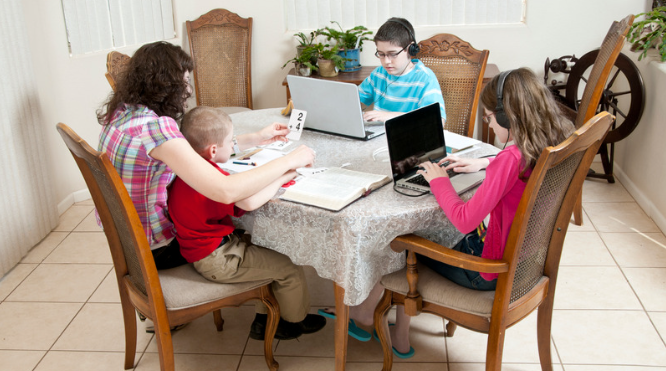What Age To Start Homeschooling
Have you been considering homeschooling but are unsure about the age to start? As an experienced homeschooling parent, I understand that this can be a daunting decision. Unfortunately, no one-size-fits-all answer to this question exists, as every child and family is unique.
It is important to remember that homeschooling can begin at any age, from preschool to high school. Many families start their homeschooling journey with their children around kindergarten age, but others wait until their child is older or even begin at a younger age.
Ultimately, the age to start homeschooling will depend on your child’s needs and family’s lifestyle. Factors such as academic ability, social skills, readiness, and family dynamics should all be considered when deciding the best age to start homeschooling.
The Pros And Cons of Starting Homeschooling Early
Homeschooling has become an increasingly popular choice for parents, but it’s hard to determine what age is the right age to start. Here are some of the main pros and cons of starting homeschooling early.
Pros
Customized Learning: One of the biggest advantages of starting homeschooling early is that parents can tailor their child’s education based on their strengths and weaknesses, providing a personalized learning experience. This unique approach has the potential to result in better academic performance and overall student satisfaction.
Flexible Curriculum: Homeschooling allows for flexibility in choosing the best educational curriculum for the child. Parents can incorporate different subjects according to their child’s interests and choose the most appropriate books and online resources to ensure a challenging and engaging learning experience.
Focus on Morals and Values: Homeschooling allows families to instill important morals, values, and ethics into their children’s learning. Parents have control over the content and can ensure their children are exposed to diverse perspectives and beliefs.
Cons
Socialization: One of the main drawbacks of homeschooling is the lack of socialization opportunities for children who do not attend traditional schools. However, homeschooling parents can organize social groups and activities for their children to interact with their peers, such as sports teams, field trips, and extracurricular activities.
Parental Responsibility: Homeschooling requires a significant commitment from parents. It can be time-consuming and require a substantial amount of personal investment.
Limited Resources: Homeschooling can be expensive, and resources such as textbooks, online programs, and educational courses may not be accessible to all families. In addition, not all parents may possess the necessary subject knowledge and expertise to provide a well-rounded education.
Ultimately, deciding what age to start homeschooling should involve carefully considering these pros and cons along with the specific needs and preferences of your child and family. It’s important to remember that homeschooling is not for everyone, but it can provide a rewarding and fulfilling experience for those who choose it.
Factors to Consider When Deciding What Age to Start Homeschooling
When it comes to homeschooling, parents often wonder what age to start homeschooling their children. This question doesn’t have a one-size-fits-all answer, as each family’s situation and children’s needs are unique. However, before making any decision, there are several factors to consider.
1. Readiness of The Child
Homeschooling a child requires discipline and commitment from both the parent and the student. Most children start formal schooling at age five or six, but some may be ready earlier or later. Assessing the child’s cognitive and emotional development, maturity, and ability to concentrate is essential before deciding what age to start homeschooling.
2. Homeschooling Method
Another factor to consider when deciding what age to start homeschooling is the homeschooling method. Some methods require a strong foundation of basic academic skills before starting, while others promote a more experiential, play-based learning approach. Parents need to choose a method that works best for their child’s learning style and interests, and that sets them up for academic success.
3. Family’s Lifestyle
Homeschooling involves a significant time commitment from parents, who take on the role of teacher and parent. Therefore, assessing the family’s lifestyle and commitments is crucial before deciding what age to start homeschooling. Families with younger children or those with work or other commitments outside the home may find it challenging to dedicate the required time and resources to homeschooling.
4. Local Laws And Regulations
Another factor to consider when deciding what age to start homeschooling is local laws and regulations. Homeschooling is legal in all 50 states, but homeschooling laws and regulations vary by state. Some states require parents to notify local school boards or file paperwork with the state. Parents should research the homeschooling laws in their state before deciding what age to start homeschooling.
In conclusion, deciding what age to start homeschooling is a complex decision that requires careful consideration. Parents must assess their child’s readiness, choose a homeschooling method that works well for their family, consider their lifestyle and commitments, and research local laws and regulations. By considering these factors, parents can make an informed decision and set their child up for academic success.
When it comes to homeschooling, many parents wonder what age is best to start. While there is no definitive answer, the decision ultimately depends on the child’s unique needs, abilities, and interests.
For some children, starting homeschooling at a younger age may work better, while others may thrive better with a more traditional educational experience until they are older. Regardless of the age you decide to begin homeschooling, it’s essential to consider the various resources and support available.
To help you on your homeschooling journey, many resources and support options are available for families with children of all ages. Here are a few resources and support options to consider, broken down by age group:
Preschool and Early Elementary Ages
– Play-based learning resources and curriculum, such as Montessori-style programs
– Educational games and activities for young children, such as ABCmouse and PBS Kids
– Online support groups and forums for parents homeschooling young children
Upper Elementary and Middle School Ages
– More structured homeschool curriculums, such as Calvert Education and Sonlight Curriculum
– Educational resources aligned with state standards, such as Time4Learning and K12
– Local homeschool co-ops and support groups for parents and students to connect with others
High School Ages
– Accredited online high school programs, such as Keystone School and American School
– Advanced coursework options, such as Advanced Placement (AP) classes and dual enrollment at a local college
– Standardized test prep resources and support, such as Khan Academy and The College Board
No matter your child’s age when you start homeschooling, resources and support are abundant available to make the experience a success. Remember to stay flexible, be patient, and always keep your child’s unique needs and interests in mind.



